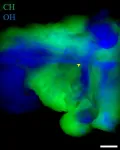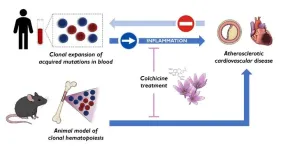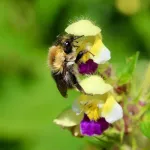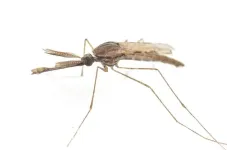(Press-News.org) Key takeaways
Young griffon vultures move frequently between sleeping sites in different locations, interacting with many friends.
They get set in their ways as they age and roost in the same spots with the same individuals; older vultures follow the same paths.
Roosts act as information hubs; older vultures may have a more thorough knowledge of where to find food resources and less need to learn about them from other vultures.
If you’d rather be watching TV on your couch than dancing at the club, you might have something in common with aging griffon vultures. New research shows that young griffon vultures move frequently between sleeping sites in different locations and interact with many friends but get set in their ways as they age, roosting in the same spots with the same individuals. As moving between roosts becomes a grind, older vultures follow the same path, establishing movement routines, that are not seen in young vultures.
Younger vultures shy away from the most popular roosts, suggesting they might be intimidated by the older ones or that there’s a vulture equivalent of “Hey you kids, get off my lawn.”
The research, published in Proceedings of the National Academy of Sciences, shows that like many people, older vultures tend to have fewer, more selective friendships with stronger bonds. They may also have a more thorough knowledge of where to find food resources.
Eurasian griffon vultures, or Gyps fulvus, are large vultures that live in the Mediterranean, the Middle East and India. With wingspans up to 9 feet, they’re much larger than North American turkey vultures and bigger than bald eagles.
Finding food can be tricky for vultures because it depends on locating animal carcasses — an unpredictable and ephemeral source. When griffon vultures find a carcass, they tend to sleep or roost nearby and feed on it over a period of days. Roosting sites can thus be ‘information hubs,’ where vultures that recently fed signal to others about food sources; they then follow each other to carcasses and form friendships that help them stay in the loop about food.
The researchers wanted to know if an individual griffon vulture’s movement patterns and social behavior changed over the course of its life. They used GPS data from 142 individually tagged birds in Israel gathered over a period of 15 years to cross-reference the vultures’ ages with their movement and social interactions at roost sites.
“What we found was as they age, their loyalty to certain roost sites increases,” said co-author Noa Pinter-Wollman, a UCLA professor of ecology and evolutionary biology. “Young vultures check out many different roosts but in middle age, they start going repeatedly to the same places.”
The study showed young vultures sometimes returned to the same roost but usually chose different ones, rarely spending two nights in the same place. From young adulthood at around 5 years old through middle age, they spent about half their nights at the same “home” site and half elsewhere. In old age, they became true homebodies.
“When they are old, from the age of 10 onward, they no longer have the energy to be ‘out and about’ and return consistently to the same site,” said corresponding author Orr Spiegel of Tel Aviv University. “Those who were adventurous at the age of 5 became more sedentary by age 10.”
As the vultures grew older, the strength of their social bonds decreased as well for at least part of the year. The number of individuals they interacted with didn’t change with age — if they had five friends when young, they still had five when older. But the amount of time they spent with vultures outside of their close friend group plummeted. Older vultures spent most of their time with and roosted mostly with these close friends. Their movements also became more routine, eventually following a predictable pattern.
The study is unique because the researchers were able to track the movements and social behaviors of the same vultures for up to 12 nearly consecutive years over a 15-year period.
“We are able to show that the trends of individuals becoming more loyal to the same sites with age is not because the more exploratory individuals die earlier and live shorter lives, and the older, more sedentary individuals live longer lives,” said first author and Tel Aviv University postdoctoral fellow Marta Acácio. “Individuals actually change their behavior with age, and this has rarely been shown in nature for long-lived birds due to the difficulty of tracking individuals for such a long time.”
The research backs up findings from studies in other species that, with age, animals become more faithful to their known sites and routines — and potentially become more selective in their social relationships. These behaviors are commonly attributed to aging in humans and can help improve understanding of how animal populations move about in their environments and relate to other members of their species, as well as identify better ways to protect them from threats. For griffon vultures, this could mean better protection of important roosting sites and using knowledge about their social interactions to reduce the risk of poisoning.
“It looks like they just get set in their ways,” Pinter-Wollman said. “They’ve gathered information over the years, and they might as well use it. Carcasses are hard to come by and roosts are information hubs. Some roosts become popular for a reason; for example, they tend to be closer to reliable food sources and older vultures potentially monopolize these roosts.”
END
Like people, vultures get set in their ways and have fewer friends as they age
Older birds tend to have more selective friendships with stronger bonds and may know better where to find food
2024-08-30
ELSE PRESS RELEASES FROM THIS DATE:
Not just a ‘bad guy,’ Tau also plays a ‘good guy’ role protecting our brains
2024-08-30
A study by researchers at Baylor College of Medicine and the Jan and Dan Duncan Neurological Research Institute (Duncan NRI) at Texas Children’s Hospital, reveals that the protein Tau – a key player implicated in several neurodegenerative conditions including Alzheimer’s disease – also plays a positive role in the brain. Tau mitigates neuronal damage caused by excessive reactive oxygen species (ROS) or free radicals and promotes healthy aging. The study was published in Nature Neuroscience.
“ROS ...
Doughnut-shaped region found inside Earth’s core deepens understanding of planet’s magnetic field
2024-08-30
A doughnut-shaped region thousands of kilometres beneath our feet within Earth’s liquid core has been discovered by scientists from The Australian National University (ANU), providing new clues about the dynamics of our planet’s magnetic field.
The structure within Earth’s liquid core is found only at low latitudes and sits parallel to the equator. According to ANU seismologists, it has remained undetected until now.
The Earth has two core layers: the inner core, a solid layer, and the outer core, a liquid layer. Surrounding the Earth’s core is the mantle. The ...
Study combines data, molecular simulations to accelerate drug discovery
2024-08-30
Researchers from the University of Cincinnati College of Medicine and Cincinnati Children’s Hospital have found a new method to increase both speed and success rates in drug discovery.
The study, published Aug. 30 in the journal Science Advances, offers renewed promise when it comes to discovering new drugs.
“The hope is we can speed up the timeline of drug discovery from years to months,” said Alex Thorman, PhD, co-first author and a postdoctoral fellow in the Department of Environmental and Public ...
NCT/UCC Dresden: Millions in funding from the Chan Zuckerberg Initiative for state-of-the-art imaging to accurately detect minute tumors
2024-08-30
The imaging techniques currently used in biological research cannot penetrate into deeper tissue layers. In cancer treatment, this means that remnants of tumors or individual cancer cells at tumor margins and in lymph nodes are not visible. Doctors performing surgery are therefore repeatedly faced with the difficult question of whether all of the affected tissue has actually been removed. For the patient's quality of life, however, the complete removal of the tumor is just as essential as the preservation of healthy tissue ...
CNIC scientists discover a new cardiovascular risk factor and identify a drug able to reduce its effects
2024-08-30
To the known risk factors for cardiovascular disease—high blood pressure, high cholesterol, diabetes, overweight and obesity, smoking, and physical inactivity—a new one has to be added: clonal hematopoiesis. This condition is triggered by acquired mutations in blood stem cells and was already known to be associated with an elevated cardiovascular risk. However, until now it was uncertain if clonal hematopoiesis was a cause or consequence of cardiovascular disease. Now, a new study published in Nature Medicine and carried out by researchers at the Centro Nacional de Investigaciones Cardiovasculares (CNIC) resolves this critical debate ...
When the heat makes you disoriented
2024-08-30
Climate change is affecting ecosystems in many different ways. One of its consequences are increasingly longer and more intense periods of heat, which affect essential natural processes – such as pollination. A team of researchers from Julius-Maximilians-Universität Würzburg (JMU) has now investigated in more detail how heat affects one particular player in these processes: The bumblebee.
"Bumblebees are important pollinators in natural and agricultural systems. They therefore ...
Showcasing latest AI updates, Insilico Medicine attends 2024 EFMC International Symposium on Medicinal Chemistry
2024-08-30
Attracting around 1,000 participants from industry and academia, the XXVIII EFMC International Symposium on Medicinal Chemistry (EFMC-ISMC) is supposed to take place in Rome, Italy from September 1-5, 2024. After the generative AI updates recently announced on the IMGAIA webinar, Insilico Medicine will be sharing more innovative details while exploring collaboration chances at Booth #50.
EFMC-ISMC is a key symposium in the field of medicinal chemistry and drug discovery, and the symposium this year features ...
Novel chemical tool aims to streamline drug-making process
2024-08-30
COLUMBUS, Ohio – The invention of a tool capable of unlocking previously impossible organic chemical reactions has opened new pathways in the pharmaceutical industry to create effective drugs more quickly.
Traditionally, most drugs are assembled using molecular fragments called alkyl building blocks, organic compounds that have a wide variety of applications. However, because of how difficult it can be to combine different types of these compounds into something new, this method of creation ...
New discoveries about how mosquitoes mate may help the fight against malaria
2024-08-30
Link to Google Drive folder containing images with caption and credit information:
https://drive.google.com/drive/folders/1UM9rl47Xd_Bs-ov0HpVwC-rtUDonM3oJ?usp=sharing
Post-embargo link to release:
https://www.washington.edu/news/2024/08/30/mosquito-swarm/
Embargoed by Current Biology
For public release at 11 a.m. U.S. Eastern Time (8 a.m. U.S. Pacific Time) on Friday, Aug. 30, 2024
A high-pitched buzzing sound in your ear is an unmistakable sign that a female mosquito is out on the hunt — for they, not males, drink blood. Hearing ...
It’s worth challenging that troubling medical bill, study finds
2024-08-30
Many people who receive a problematic medical bill don’t challenge it – but new USC Schaeffer Center research shows they are likely missing out on a chance for financial relief.
About 1 in 5 people said they recently received a medical bill they disagreed with or couldn’t afford, including 61.5% who said they contacted a billing office to address their concern, according to survey results published Aug. 30 in JAMA Health Forum. Most who reached out said they received some form of payment help or had their bill corrected.
It’s ...
LAST 30 PRESS RELEASES:
ASU researchers to lead AAAS panel on water insecurity in the United States
ASU professor Anne Stone to present at AAAS Conference in Phoenix on ancient origins of modern disease
Proposals for exploring viruses and skin as the next experimental quantum frontiers share US$30,000 science award
ASU researchers showcase scalable tech solutions for older adults living alone with cognitive decline at AAAS 2026
Scientists identify smooth regional trends in fruit fly survival strategies
Antipathy toward snakes? Your parents likely talked you into that at an early age
Sylvester Cancer Tip Sheet for Feb. 2026
Online exposure to medical misinformation concentrated among older adults
Telehealth improves access to genetic services for adult survivors of childhood cancers
Outdated mortality benchmarks risk missing early signs of famine and delay recognizing mass starvation
Newly discovered bacterium converts carbon dioxide into chemicals using electricity
Flipping and reversing mini-proteins could improve disease treatment
Scientists reveal major hidden source of atmospheric nitrogen pollution in fragile lake basin
Biochar emerges as a powerful tool for soil carbon neutrality and climate mitigation
Tiny cell messengers show big promise for safer protein and gene delivery
AMS releases statement regarding the decision to rescind EPA’s 2009 Endangerment Finding
Parents’ alcohol and drug use influences their children’s consumption, research shows
Modular assembly of chiral nitrogen-bridged rings achieved by palladium-catalyzed diastereoselective and enantioselective cascade cyclization reactions
Promoting civic engagement
AMS Science Preview: Hurricane slowdown, school snow days
Deforestation in the Amazon raises the surface temperature by 3 °C during the dry season
Model more accurately maps the impact of frost on corn crops
How did humans develop sharp vision? Lab-grown retinas show likely answer
Sour grapes? Taste, experience of sour foods depends on individual consumer
At AAAS, professor Krystal Tsosie argues the future of science must be Indigenous-led
From the lab to the living room: Decoding Parkinson’s patients movements in the real world
Research advances in porous materials, as highlighted in the 2025 Nobel Prize in Chemistry
Sally C. Morton, executive vice president of ASU Knowledge Enterprise, presents a bold and practical framework for moving research from discovery to real-world impact
Biochemical parameters in patients with diabetic nephropathy versus individuals with diabetes alone, non-diabetic nephropathy, and healthy controls
Muscular strength and mortality in women ages 63 to 99
[Press-News.org] Like people, vultures get set in their ways and have fewer friends as they ageOlder birds tend to have more selective friendships with stronger bonds and may know better where to find food




